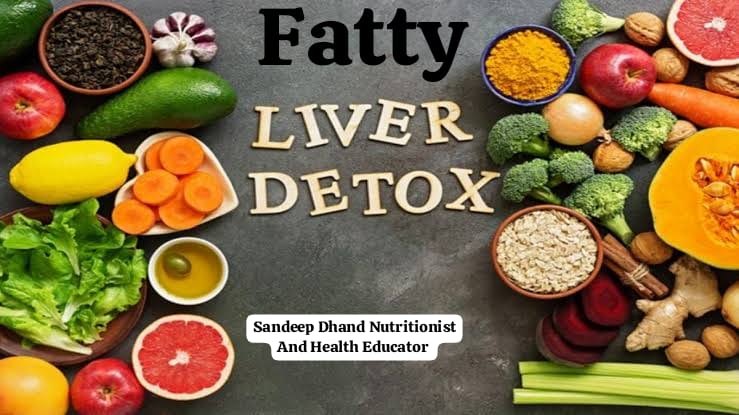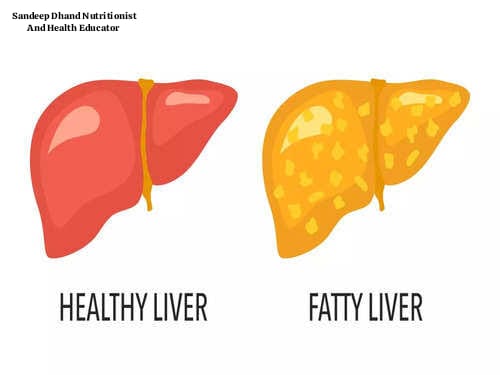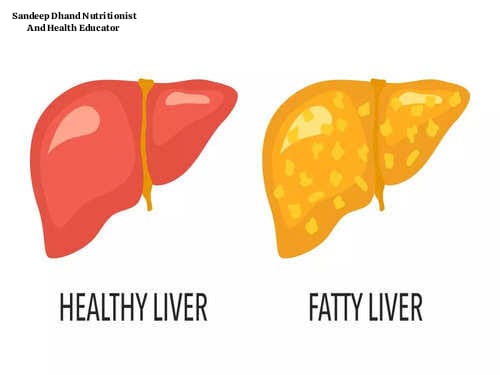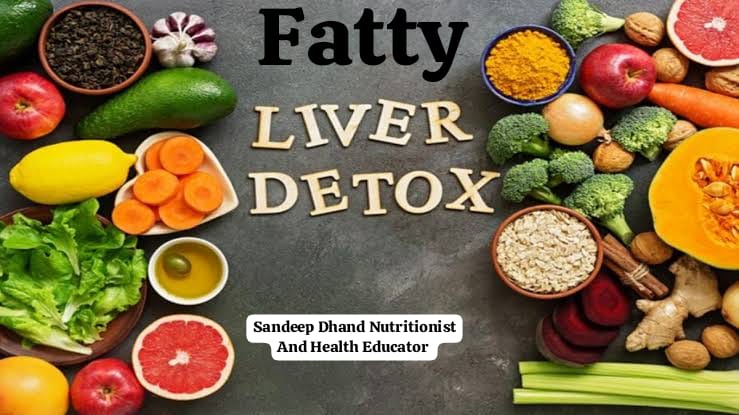Sandeep Dhand
Nutritionist And Health Educator
The liver is one of the most vital organs in our body. It plays a central role in detoxifying the blood, producing bile to digest fats, and storing energy in the form of glycogen. However, when fat builds up in the liver, it can lead to a condition called fatty liver disease. While it’s normal to have some fat in the liver, excess fat can cause inflammation and even permanent liver damage. This article will explore how to detox a fatty liver, focusing on lifestyle changes, dietary habits, and natural remedies.
What Is Fatty Liver Disease?

Fatty liver disease occurs when fat makes up more than 5-10% of the liver’s weight. It is primarily of two types:
- Alcoholic Fatty Liver Disease (AFLD): Caused by excessive alcohol consumption.
- Non-Alcoholic Fatty Liver Disease (NAFLD): Not related to alcohol, often linked to poor diet, obesity, or insulin resistance.
If left untreated, both types can lead to liver inflammation, scarring (fibrosis), or even liver failure.
Can You Detox a Fatty Liver?
The term “detox” often brings to mind cleansing juices or herbal remedies. However, detoxing a fatty liver primarily involves making sustainable lifestyle and dietary changes to reduce fat accumulation and improve liver health. The liver is naturally capable of repairing itself when given the right conditions.
Steps to Detox Your Fatty Liver
- Adopt a Healthy Diet
What you eat has a profound impact on your liver health. Focus on these dietary tips:
Increase Fiber: High-fiber foods like whole grains, fruits, and vegetables help improve digestion and prevent fat buildup in the liver.
Healthy Fats: Replace saturated fats with unsaturated fats from sources like olive oil, nuts, and avocados.
Low Sugar: Excess sugar is converted into fat in the liver, so avoid sugary drinks, desserts, and processed foods.
Protein: Lean protein sources like fish, chicken, eggs, and legumes can support liver repair.
Antioxidant-Rich Foods: Include foods like berries, green tea, and dark leafy vegetables, which reduce oxidative stress and inflammation in the liver.
- Stay Hydrated
Water helps flush out toxins and supports the liver in metabolizing fat. Aim to drink at least 8-10 glasses of water daily.

- Exercise Regularly
Physical activity reduces fat in the liver and improves overall metabolism. Incorporate the following:
Aerobic Exercises: Activities like walking, jogging, or swimming improve heart and liver health.
Strength Training: Helps build muscle and reduces fat deposits in the body.
Aim for at least 30 minutes of moderate exercise five days a week.
- Lose Excess Weight
Obesity is a major contributor to fatty liver disease. Losing even 5-10% of your body weight can significantly reduce liver fat.
Calorie Deficit: Consume fewer calories than you burn.
Track Progress: Use a food diary or app to monitor your eating habits and exercise routine.
- Limit Alcohol Consumption
If you have AFLD, cutting out alcohol is crucial. Even if you have NAFLD, reducing alcohol intake can prevent further liver damage.

- Manage Blood Sugar Levels
High blood sugar leads to fat accumulation in the liver. You can manage blood sugar by:
Eating low-glycemic foods like oats, lentils, and non-starchy vegetables.
Avoiding refined carbs like white bread and sugary cereals.
- Natural Detox Remedies
While a healthy diet and exercise are the foundation, certain natural remedies may help support liver detox:
Milk Thistle: Known for its liver-protective properties.
Turmeric: Contains curcumin, which reduces inflammation and promotes liver health.
Green Tea: Loaded with antioxidants that reduce liver fat.
Consult a healthcare provider before trying any supplements.
- Get Enough Sleep
Quality sleep helps regulate hormones and metabolic processes, aiding in liver detox. Aim for 7-8 hours of uninterrupted sleep each night.
- Avoid Toxins
Minimize exposure to harmful substances like pesticides, chemicals, and tobacco. These toxins add stress to the liver.
Signs Your Liver Is Improving
As your liver detoxes, you may notice these positive changes:
Increased energy levels.
Improved digestion.
Weight loss.
Reduced abdominal discomfort.

When to See a Doctor
If your fatty liver symptoms persist or worsen, consult a doctor. Common signs of liver issues include:
Persistent fatigue.
Jaundice (yellowing of the skin or eyes).
Swelling in the abdomen or legs.
Your doctor may recommend further tests or medications to manage the condition.
Final Thoughts
Detoxing a fatty liver is not about quick fixes; it’s a long-term commitment to healthier living. By adopting a balanced diet, exercising regularly, and managing other risk factors, you can reverse the damage and enjoy better overall health. Remember, small, consistent changes can lead to significant improvements. Always consult a healthcare professional for personalized advice tailored to your specific needs.
